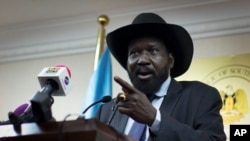JUBA —
A group made up of former officials in the South Sudanese government, political analysts and lawyers has crafted a plan for what an interim government for the country could look like -- and their vision is very different from the current reality.
The draft proposal, released over the weekend by the Development Policy Forum, calls for a complete government overhaul and suggests a rotating five-person presidency and 21 different cabinet positions.
"We determined the objectives, deliverables, outputs, and then the activities required. Then we worked backwards," Lual Deng, managing director of the Ebony Center for Strategic Studies, a local think tank that manages the Policy Forum, told South Sudan in Focus.
"We felt that, comfortably, we need 18 ministries, plus a prime minister and two deputies. So you have 21,” he said.
Deng side-stepped a question on whether President Salva Kiir and opposition leader Riek Machar would be included in the five-person executive, which he said would focus on promoting social cohesion.
The ministries, meanwhile, would be staffed by technocrats instead of politicians.
They would work on addressing the country's most pressing, short-term needs, including conducting a census, registering voters and finalizing a new constitution for the young country. They would also work on longer term projects, such as improving delivery of services, including education, health and infrastructure, and job creation.
The interim government might eliminate the legislature entirely, since the main focus would be on implementing existing legislation, not passing new laws, Deng said.
It would sit for three years, after which national elections would be held.
Deng said the group was inspired to come up with its new model of government some two weeks ago. U.S. Secretary of State John Kerry had called for Kiir to consider setting up an interim government to run the country which has suffered months of fighting between pro-government forces against fighters loyal to Machar.
The group has submitted a copy of its proposal to General Lazaro Sumbeiywo, one of the mediators at peace talks for South Sudan in Addis Ababa. Deng said he "seemed to be happy with it because he said it would make their work easy."
The slow-moving peace talks, brokered by the regional Intergovernmental Authority on Development (IGAD), have struggled to restore peace in South Sudan since they began in January.
Kiir and Machar are also thought to have seen the Policy Forum's document, Deng said, speculating that the proposal could have been the impetus behind Kiir's announcement that national elections will be postponed from next year until 2017 or 2018 to give South Sudanese ample time to reconcile after months of fighting.
The draft proposal, released over the weekend by the Development Policy Forum, calls for a complete government overhaul and suggests a rotating five-person presidency and 21 different cabinet positions.
"We determined the objectives, deliverables, outputs, and then the activities required. Then we worked backwards," Lual Deng, managing director of the Ebony Center for Strategic Studies, a local think tank that manages the Policy Forum, told South Sudan in Focus.
"We felt that, comfortably, we need 18 ministries, plus a prime minister and two deputies. So you have 21,” he said.
Deng side-stepped a question on whether President Salva Kiir and opposition leader Riek Machar would be included in the five-person executive, which he said would focus on promoting social cohesion.
The ministries, meanwhile, would be staffed by technocrats instead of politicians.
They would work on addressing the country's most pressing, short-term needs, including conducting a census, registering voters and finalizing a new constitution for the young country. They would also work on longer term projects, such as improving delivery of services, including education, health and infrastructure, and job creation.
The interim government might eliminate the legislature entirely, since the main focus would be on implementing existing legislation, not passing new laws, Deng said.
It would sit for three years, after which national elections would be held.
Deng said the group was inspired to come up with its new model of government some two weeks ago. U.S. Secretary of State John Kerry had called for Kiir to consider setting up an interim government to run the country which has suffered months of fighting between pro-government forces against fighters loyal to Machar.
The group has submitted a copy of its proposal to General Lazaro Sumbeiywo, one of the mediators at peace talks for South Sudan in Addis Ababa. Deng said he "seemed to be happy with it because he said it would make their work easy."
The slow-moving peace talks, brokered by the regional Intergovernmental Authority on Development (IGAD), have struggled to restore peace in South Sudan since they began in January.
Kiir and Machar are also thought to have seen the Policy Forum's document, Deng said, speculating that the proposal could have been the impetus behind Kiir's announcement that national elections will be postponed from next year until 2017 or 2018 to give South Sudanese ample time to reconcile after months of fighting.





